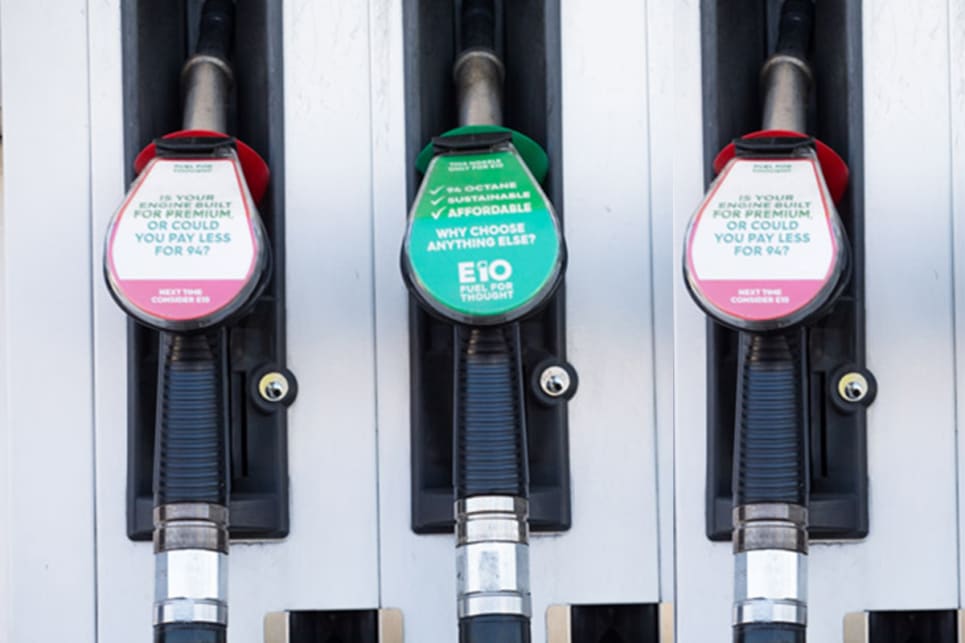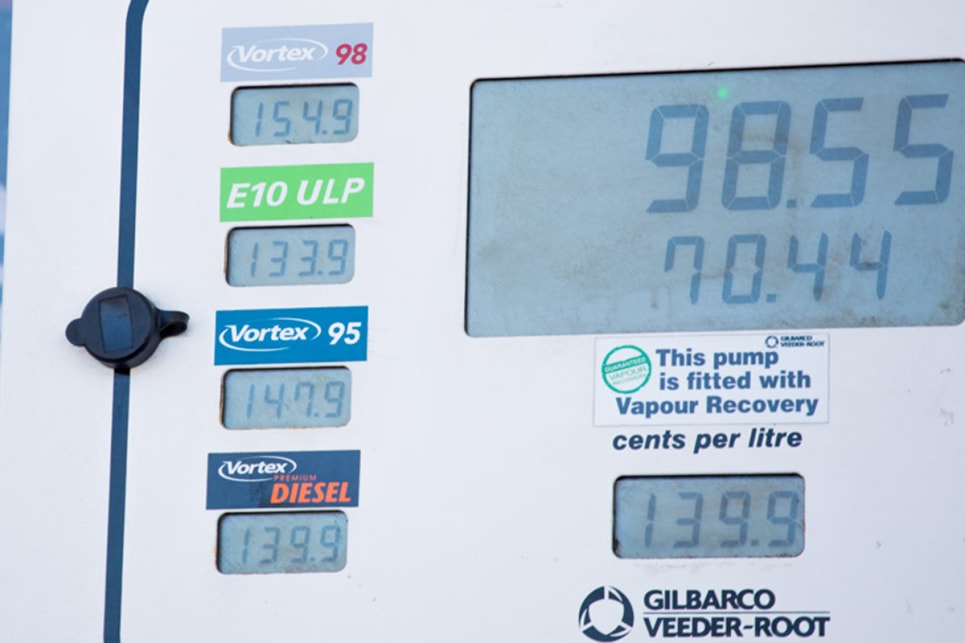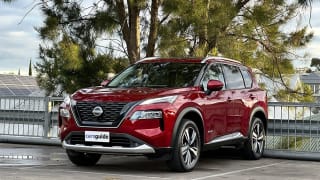
Unleaded vs E10 - the comparison test
Without petrol most of our cars are useless, but few people realise how much this liquid made from dead dinosaurs has changed over the last few years, and what effect it will have on their hip pocket.
Discounting diesel and LPG, there are four main types of petrol sold in Australia, including E10, Premium 95, Premium 98, and E85, and we’ll tell you below not only how they differ but which one you should use.
Fuel comparison by the numbers
You’ll see mention of 91RON, 95RON, 98RON, even 107RON, and what these numbers relate to is the measured amount of octane in the fuel as a Research Octane Number (RON).
These RON numbers are different to the American scale which uses MON figures (Motor Octane Numbers), in much the same way as we use metric measurement and the US relies on imperial figures.
At its most basic and over-simplified, the higher the number the better the quality of the fuel. Years ago you had the choice of three types of petrol fuels; 91RON (unleaded), 95RON (premium unleaded) and 98RON (UPULP - Ultra Premium Unleaded Petrol).
Many basic cars would run around on the cheaper 91RON unleaded, though many European imports required 95RON PULP as a minimum-grade fuel.
High-performance and modified cars generally used 98RON with its higher octane and better cleaning abilities. However, these fuel comparisons have changed thanks to the new ethanol-based fuels like E10 and E85.
E10 vs Unleaded
What is E10? The E in E10 stands for ethanol, a form of alcohol added to fuel to make them more environmentally friendly to produce and use. E10 fuel has largely replaced the old basic fuel we knew as 'Unleaded' and which carried an octane rating of 91RON.
The key difference between E10 and unleaded is E10 is made up of 90 per cent unleaded with a blend of 10 percent ethanol content.
The ethanol helps to lift its octane rating to 94RON, but that doesn’t translate into higher performance or improved mileage as the alcohol content actually increases fuel consumption due to the fuel’s energy density (or how much power you get from each litre of fuel burned).
The battle of E10 vs 91 fuels is largely over as E10 has mostly replaced the more expensive 91 unleaded.
When it comes to choosing in the ethanol vs petrol debate it's important to read the owner’s manual of your car, or the sticker behind the fuel door, to see what the manufacturer recommends as a minimum grade of fuel safe to use in your car.
If you’re unsure if your car can run on ethanol fuels check on the Federal Chamber of Automotive Industries website.
Alcohol warnings
If your car was built before 1986, back in the days of leaded fuels, you cannot use ethanol fuels and should only run 98RON UPULP. This is because the ethanol can cause rubber hoses and seals to fail, and can lead to a gum forming in the engine that will stop it running.
While older cars also needed a leaded fuel additive back in the day, modern 98RON UPULP is fine to run on its own and will not cause damage to older engines like 91 or 95 unleaded fuels used to 20 years-ago when they were introduced.
E10 vs 98 Ultra-Premium
There is a popular myth that higher octane fuel like 98 UPULP will give ordinary cars more performance and better economy. Unless your car has been specifically tuned to run solely on 98RON UPULP this is simply not true, and any gains in efficiency would come from the improved cleaning ability of 98 removing built-up gunk inside your engine that was already hurting your fuel economy.
98RON UPULP generally costs up to 50c per-litre more than E10 so it can be an expensive way to fill your car for very little performance gain, although there are benefits with no ethanol content meaning it is safe to use in all petrol cars, and can help protect the engine on very hot days when there is a risk of poor performance when using lower-grade fuels.
One area 98 ultra-premium fuel excels over the cheaper petrol options is its cleaning ability. It is worth filling your car with 98 UPULP if you are going on a long trip of several hundred kilometres or more, as the cleaning properties should help remove any built-up gunk inside your engine.
Knock, knock?
One thing that can kill engines super-fast is detonation, also known as knocking or pinging. Knock occurs when the air and fuel mixture in the engines ignites at the wrong time due to the combustion chamber being too hot, or the fuel being poor quality.
Manufacturers recommend a minimum-grade fuel for their cars as a way to safeguard against detonation, as engine specifications can differ internally, and some will need higher-octane (RON) fuel to run safely.
Engines in high-performance cars, like those offered by Porsche, Ferrari, HSV, Audi, Mercedes-AMG and BMW, rely on the higher octane ratings found in Ultra Premium Unleaded Petrol (UPULP) as these engines have a higher level of tune and performance, making for hotter cylinders more prone to detonating, than average engines.
The danger of detonation is it is extremely difficult to sense or hear it, so the safest way to avoid knock is to use at least the minimum grade of petrol recommended for your car, if not an even higher grade when the weather is exceptionally hot (and engines are therefore more prone to detonation).
E85 – the boost juice
The sweet-smelling high-performance E85 was touted by some manufacturers as a solution to sustainable fossil fuels five years ago, however its terrible burn-rate and scarcity means it hasn't caught on, except in ultra-high-performance modified cars.
E85 is made up of 85 per cent ethanol, with 15 per cent unleaded blended in, and, if your car is tuned to run on it, your engine can operate at cooler temperatures as well as making a lot more power for turbocharged and supercharged cars.
While it is often cheaper than 98 UPULP it also reduces fuel economy by 30 per cent, and, if used in cars not specifically set-up for it, can destroy fuel system components leading to engine failure.
Conclusion
In the end, how you drive, and filling up at the low point of the weekly petrol price cycle, will have a bigger impact on your fuel economy than changing what fuel you use.
So long as you check the minimum type of fuel your car needs (and get it serviced on time) there will be scant difference between 91 ULP, E10, 95 PULP and 98 UPULP.












Comments